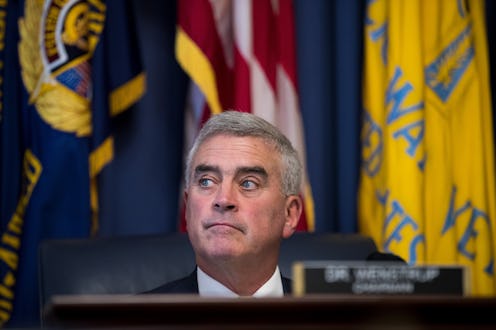News
This Congressman Actually Compared How The FBI Treated MLK To What It's Doing To Trump

Sometimes, political comparisons fall flat. In an interview on Tuesday, Ohio Republican Rep. Brad Wenstrup said the FBI treated Donald Trump like it did MLK Jr.. Wenstrup said on Fox News Tuesday, "Look, the types of things that we’re hearing about now — it was wrong when they did it to Martin Luther King [Jr.], and it’s wrong if they do it to the Trump campaign." Bustle has reached out to Fox News for comment.
Wenstrup, who is also a member of the House Intelligence Committee, went on to say that the public is "tired of the stalling and the excuses" from the Justice Department and the FBI regarding the Trump-Russia investigation. "Frankly," he added, "so are we."
Wenstrup's comments come only two days after Trump tweeted about the FBI saying that he would "demand" the Department of Justice to "look into whether or not the FBI [or] DOJ infiltrated or surveilled the Trump Campaign for Political Purposes - and if any such demands or requests were made by people within the Obama Administration!"
The federal probe into possible collusion between Trump's presidential campaign and Russia — which the president has denied through the White House — has long upset the president and his fans. In May, Trump called the FBI probe a "witch hunt" while, last year, his supporters in Michigan told Vox that the FBI investigation was "fake news."
Wenstrup's diatribe against the FBI on Fox News continued, "If these agencies feel that they have authority over the American people, then our government is turned upside down. It's on its head." He described the federal agency as "rogue" and said that Americans needed to be made aware of its reported conduct.
"I call it arrogant authority. It's something that the American people need to know about," Wenstrup said. "When you start putting your politics over your country, over God, family, and country, we have a problem. That's my greatest concern with what is going on and taking place. American people deserve to know every bit of it."
Wenstrup did not mention the exact and often terrifying ways that the FBI had essentially hounded King during his life as an activist and leading civil rights figure. Wenstrup did not bring up the sinister letter that the FBI sent to King under former FBI Director and Republican John Edgar Hoover in 1964.
In 2014, The New York Times retrieved a scan of the letter from the National Archives at College Park, Maryland, in which an anonymous FBI figure told King, "You are done." In one particular passage, the letter addressing King said, "Look into your heart. You know you are a complete fraud and a great liability to all of us Negroes. White people in this country have enough frauds of their own but I am sure they don't have at this time that is anywhere near your equal. You are no clergyman and you know it. I repeat you are a colossal fraud and an evil, vicious one at that."
Some have said that the FBI letter encouraged King to kill himself in the last passage. "King, there is only one thing left for you to do," the letter read. "You know what it is ... There is but one way out for you. You better take it before your filthy, abnormal, fraudulent self is bared to the nation."
There is no indication whatsoever that the FBI sent a similarly worded letter to Trump. (The FBI would not send a letter like that to Trump anyway, as he is the president of the United States.) But it won't be the first time that such a historically inaccurate parallel was drawn. In early May, the National Rifle Association's incoming president Oliver North told The Washington Times that the NRA was being treated worse than black Americans under Jim Crow era laws — a time notorious for its abhorrent lynchings of African-Americans.
On social media at the time, Twitter users had lambasted North for his remarks. There seemed to be similar criticism for Wenstrup's remarks. In one case, a Twitter user said that it was "absolutely disgraceful" to liken "a man campaigning for social justice to a man looking out for himself first, second, and third."